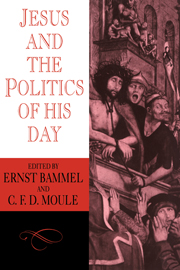Book contents
- Frontmatter
- Contents
- Abbreviations
- Foreword
- The Zealots and Jesus
- The revolution theory from Reimarus to Brandon
- The date and character of Mark
- Some observations on Tendenzkritik
- Argumentum e silentio
- The Poor and the Zealots
- The opposition between Jesus and Judaism
- Judaeo-Christianity and the Jewish establishment, A.D. 33–66
- A.D. 70 in Christian reflection
- The trial of Jesus in the Acta Pilati
- Christ as brigand in ancient anti-Christian polemic
- Jesus as a political agent in a version of the Josippon
- The Feeding of the Multitude
- The coin of ‘Render unto Caesar …’ (A note on some aspects of Mark 12: 13–17; Matt. 22: 15–22; Luke 20:20–26)
- Render to Caesar
- The Temple tax
- ‘Not peace but a sword’: Matt. 10:34ff; Luke 12: 51ff
- The decision of the Supreme Court to put Jesus to death (John 11:47–57) in its context: tradition and redaction in the Gospel of John
- The ‘triumphal’ entry
- The two swords (Luke 22: 35–38)
- The titulus
- Romans 13
- Biblical criticism criticised: with reference to the Markan report of Jesus's examination before the Sanhedrin
- The political charge against Jesus (Luke 23: 2)
- The trial before Pilate
- ‘His witness is true’: A test of the Johannine claim
- Index of Authors
- Index of References
‘His witness is true’: A test of the Johannine claim
Published online by Cambridge University Press: 19 January 2010
- Frontmatter
- Contents
- Abbreviations
- Foreword
- The Zealots and Jesus
- The revolution theory from Reimarus to Brandon
- The date and character of Mark
- Some observations on Tendenzkritik
- Argumentum e silentio
- The Poor and the Zealots
- The opposition between Jesus and Judaism
- Judaeo-Christianity and the Jewish establishment, A.D. 33–66
- A.D. 70 in Christian reflection
- The trial of Jesus in the Acta Pilati
- Christ as brigand in ancient anti-Christian polemic
- Jesus as a political agent in a version of the Josippon
- The Feeding of the Multitude
- The coin of ‘Render unto Caesar …’ (A note on some aspects of Mark 12: 13–17; Matt. 22: 15–22; Luke 20:20–26)
- Render to Caesar
- The Temple tax
- ‘Not peace but a sword’: Matt. 10:34ff; Luke 12: 51ff
- The decision of the Supreme Court to put Jesus to death (John 11:47–57) in its context: tradition and redaction in the Gospel of John
- The ‘triumphal’ entry
- The two swords (Luke 22: 35–38)
- The titulus
- Romans 13
- Biblical criticism criticised: with reference to the Markan report of Jesus's examination before the Sanhedrin
- The political charge against Jesus (Luke 23: 2)
- The trial before Pilate
- ‘His witness is true’: A test of the Johannine claim
- Index of Authors
- Index of References
Summary
In any study of the Jesus of history the place of the Fourth Gospel and the use to be made of its evidence is problematic. And nowhere is this issue more acute than in the events leading up to his conviction and death. For John has an extensive and detailed narrative of these events which differs at a number of vital points – not least in its chronology – and yet where the degree of overlap with the other accounts is greater than anywhere else. C. H. Dodd has observed how extensive and detailed this parallelism is – so much so that one of two conclusions is inevitable. Either John's account evinces literary dependence on that of the synoptists or it embodies an independent tradition with serious claims to take us back to the facts and interpretation that created and controlled the common Christian preaching. With now the growing weight of contemporary scholarship, I cannot find the former a credible explanation, and Dodd's own examination of the passion narrative, from which he begins his massive exposition, is a sufficient statement of the case. But if John's is an independent voice, how are we to assess how he stands to the truth of the matter? For the claim of the Johannine community is that ‘his witness is true’ (John 21: 24), which in turn is based on the personal testimony of 19:35: ‘This is vouched for by an eyewitness, whose evidence is to be trusted. He knows that he speaks the truth, so that you too may believe.’
- Type
- Chapter
- Information
- Jesus and the Politics of his Day , pp. 453 - 476Publisher: Cambridge University PressPrint publication year: 1984
- 1
- Cited by



